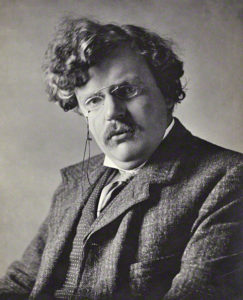G.K. Chesterton, Collected Works, Volume XXXIII

G.K. Chesterton wrote a weekly column for The Illustrated London News from the mid-1900s to the mid-1930s. Ignatius Press has assembled his essays into several volumes, as part of its massive Collected Works compilation. Despite being a century old, Chesterton’s insights are just as pertinent today as they were then — in fact, even more so.
Because Chesterton’s ideas are so important, I thought I’d share some of my favorite passages from each volume. With luck they will spark your interest in reading more. The passages below are a mere taste; Chesterton’s most engaging ideas are too involved and too amazing to be boiled down into a short excerpt.
In this volume, there’s a lot about socialism, bolshevism, capitalism, theology, philosophy and education. Get the book here.
“First, there is that stink of stale and sham science which is one of the curses of our times. The stupidest or the wickedest action is supposed to become reasonable and respectable, not by having found a reason in scientific fact, but merely by having found any sort of excuse in scientific language.” (09-29-1923)
“Now, the Carthaginians were a highly civilized and even refined people, whose religion largely consisted of burning alive a large number of children as a sacrifice to Moloch.” (12-29-1923)
“Have we no right to protect the outlines, the forms, the achievements of man, the creations of national culture, against an infinite alien immigration of things possibly inferior and certainly unknown?” (03-01-1924)
“It is obvious, of course, that a permanent ideal is absolutely necessary to anything like progress or reform. You cannot reform what is eternally formless; and you cannot march towards what is always moving about.” (03-08-1924)
“The notion that America is advanced only shows how deceptive is the mask of machinery and materialistic science.” (08-02-1924)
“Why is it that for the last two or three centuries the educated have been generally wrong and the uneducated relatively right? … What the educated man has generally done was to ram down everybody’s throat some premature and priggish theory which he himself afterwards discovered to be wrong; so wrong that he himself generally recoiled from it and went staggering to the opposite extreme.” (08-09-1924)
“Personally I think the Socialist and the Capitalist are very much alike, especially in the great unifying quality of both being wrong.” (11-08-1924)
“But, instead of calling things dogmas when he accepts them as dogmas, he only calls them dogmas when he does not accept them. Other people’s dogmas are dogmas; but his dogmas are only truths. This does not seem to me to show any deficiency in the matter of dogmatism.” (03-14-1925)
“And those who have this taste do, in fact, find that it helps them to think about religion, to have some sort of clear statement of what they really think about it. In other words, they can think more clearly with the assistance of a creed. They find this impression strongly supported by the style of thinking they observe in those who do it without a creed. They do not believe that Euclid would have got on any better if he had merely experienced emotions instead of writing down axioms; or even if he had tried to express the nature of an isosceles triangle by breathing softly or agitating his left leg. They believe that there is a rational side of religion — that is, that it is possible to have definition, and therefore to have doctrines or dogmas.” (03-14-1925)
“But, anyhow, the historian ought to be made to understand that his day is only a day. He is apt to treat it as if it were a day of judgment. ” (08-15-1925)
“The world is growing so wild and experimental that almost everything that can be suggested as a fancy is found to be already a fact.” (09-12-1925)
“If the collective economic power is not strong enough to tyrannise, it is not strong enough to do anything that a Socialist wants it to do. If it has not power enough to commit injustice, it has not power enough to prevent injustice.” (10-10-1925)
“The modern trouble is that people find it easy to assume that there are regulations about semaphoring; they find it easy to realise, even at an early age, that there are rules for spelling; in the same sense, at least, they can be brought to believe that there are rules for reading; but nothing in heaven or earth or under the earth will really persuade them nowadays that there are rules for reasoning.” (11-21-1925)

The first quote was my favorite until I read the last quote — but I think they are related.
They probably are … This particular volume is full of critical thinking tips.